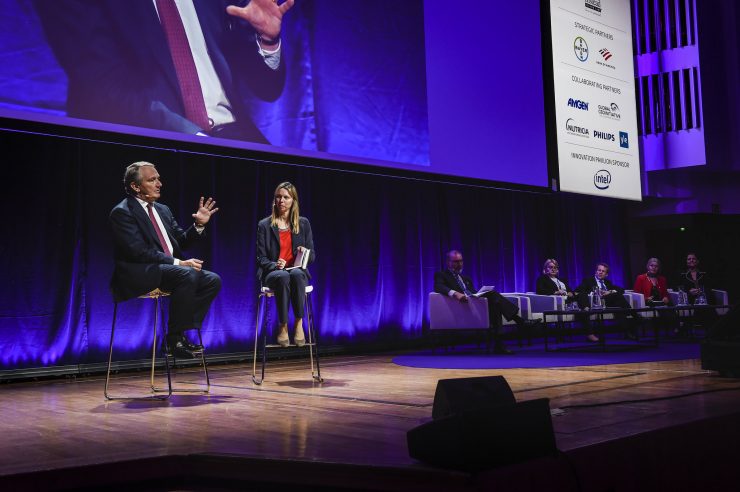First-Ever High-Level Forum on the Silver Economy Issues Call-to-Action for Businesses and Governments to Leverage the Unprecedented Aging Shift
Helsinki, FINLAND (July 16, 2019) – Global, national, and local business and government leaders came together in Helsinki last week for the first time ever to drive action toward co-created innovation in products, services, and public policies that help enable and meet the needs of our growing global aging society. The High-Level Forum on the Silver Economy focused on how worldwide aging and longevity are transforming the landscape for business and government alike and brought forth new approaches to outdated models of health, caregiving, financial planning, work, retirement, technology, and perceptions toward aging, recognizing the aging of society need not be a burden but is in fact an opportunity for economic growth. This is the Silver Economy.
The two-day Forum – the result of a unique collaboration between the Government of Finland and the private sector-led Global Coalition on Aging (GCOA) – was the first official convening of the Finnish EU Council Presidency. Participants included top government ministers from around the world, CEOs from Fortune 100 companies, and thought leaders from global institutions, academia, think tanks, the media, and non-governmental organizations.

© Lehtikuva
The Silver Economy Forum drew more than 600 expert attendees and another 4,000 live webcast viewers, representing nearly 50 countries from around the world. The discussion at the two-day conference emphasized the need for business leaders and policymakers to radically rethink the status quo, reimagining products and services, workplaces, government policies, and societal institutions to support longer lifespans, multi-generational engagement, and more years of healthy and productive life.
“Aging is not strictly about old people; it’s about all people,” said Jeff Huber, President and CEO of Home Instead Senior Care, setting the tone for the historic two-day event in his opening keynote address. “Aging knows no borders, no laws, no government system, no religion, and no economic system. Aging unites us.”
More than 60 expert speakers led conversations at the Forum, highlighting the many opportunities and imperatives to realizing and maximizing the potential of the Silver Economy:
- Action now: The paradigm shift for how we do business and organize society related to the aging of society is happening now, so cross-disciplinary collaborative actions must be taken now.
- Co-creation: Creation of products, services, and policies must be done in partnership with end users – and not only older people themselves, but also their caregivers, families, and communities.
- No to ageism: Inclusion of older people across society is an imperative for harnessing the power of the Silver Economy – in the workplace, as consumers, and as valuable contributors to society – and relies upon stamping out ageist stereotypes.
- Prevention, wellbeing, and functional ability: Health systems change must focus on preventive services and better awareness of the conditions that increase in prevalence with age, utilizing integrated and person-centered care as well as remote care and digital monitoring tools, all with the goal of achieving functional ability as we age.
- Financial tools for longer lives: Financially, pension systems and retirement saving must be re-imagined so that individuals, financial institutions, and policymakers all work toward new strategies to build financial wellness for the 100-year life.
- Workplace change: Employers must evolve to ensure that they can more fully leverage the contributions of the five generations currently in the workplace, which demands ongoing up-skilling and re-skilling of employees to keep pace with changing societal needs and continuous technological innovation.

© Lehtikuva
“This year – 2019 – is a critical inflection point for aging and longevity, from the Japanese leadership of the G20 to center stage at this year’s Cannes Lions Advertising Awards and to Helsinki and the Silver Economy Forum,” said Michael W. Hodin, PhD, CEO of GCOA, and one of the principal organizers of the Forum. “As the World Health Organization prepares to declare 2021-2030 as the Decade of Healthy Ageing, leaders from the private sector, international institutions, and the government are increasingly recognizing that we are in the midst of a total paradigm shift. Today, we have a real opportunity to plan for and get in front of a global megatrend that is completely remaking society as we know it to ensure that it is a pathway for economic growth and greater wellbeing for all.”
To view the agenda, speaker information, videos, and photos from the Forum, please visit at www.thesilvereconomyforum.com.
The High-Level Forum on the Silver Economy was organized in collaboration with the public and private sectors and with the support of our partners and sponsors:

Please contact Susan Wile Schwarz, Director of Communications, Global Coalition on Aging, for more information: [email protected] or by phone +1 917 946 1254.
 Global Coalition On
Global Coalition On 